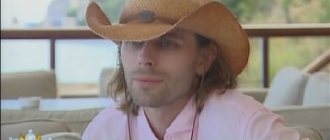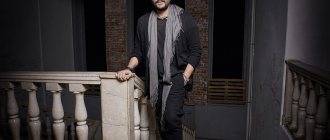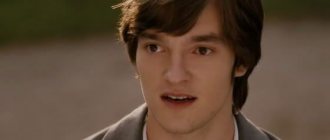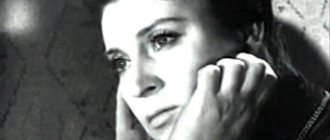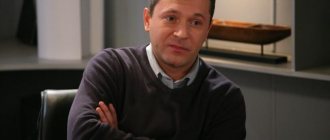Childhood and youth
Nikita Kukushkin was born on November 14, 1990 in the city of great opportunities - Moscow. It is known that the mother was involved in raising the future TV star. According to the actor, he never saw his father. Due to the fact that Nikita’s childhood years were spent under the supervision of his mother, who physically could not monitor her son for 24 hours, the artist periodically ran away from home.
The parent often found her beloved child either near a blazing trash can, or in a drain hole near a greenhouse, or in a neighboring area. Despite the heir’s love of adventure, the mother never punished the actor, trying to convey to her son in words that there was nothing good in his adventures.
Before entering the Moscow Art Theater, the actor studied at a Moscow school with a theatrical focus. Even then, Nikita mocked the usual school hierarchy, denied the values that teachers tried to instill in the young hooligan, and constantly fooled around. Unfortunately, the artist completed his 10th and 11th grades at a comprehensive school, where the head teacher took bribes with washing machines. In 2012, Kukushkin graduated from the Moscow Art Theater School and became an actor at the Gogol Center.
Gogol Center
However, the last couple of years have not discouraged him from becoming an artist. Nikita entered the Moscow Art Theater School, and after graduation he ended up at the Gogol Center. After some time, the young man began acting in films.
He first appeared on screens in “Okolofootball”, but most of all the viewer remembered him, of course, in “Correction Class”. For this film Nikita received a special cinema prize. After him, the actor began to receive much more invitations to films, but still considers himself a niche theater artist.
Movies
2013 was marked by the release of Kukushkin’s debut films - “Okolofootball” and “Immersion”. In June 2014, at the XXV Open Russian Film Festival “Kinotavr”, the premiere of Ivan Tverdovsky’s drama “Correction Class”, which tells about the first love and cruelty of teenagers, took place.
In this film, Kukushkin played the role of a young man named Misha, unrequitedly in love with the main character, a girl confined to a wheelchair. After the film's release, critics predicted a brilliant future for the actor, calling him the discovery of the year. It is known that this image brought Nikita a special Jury Prize at the Amur Autumn Film and Theater Festival on Amur.
In 2015, the eminent artist’s filmography was replenished with the films “Security,” “Butterflies” and “Eternal Cold.” In February 2016, the premiere of Alexey Kamynin’s 30-minute psychological thriller “It’s Not Me” took place. The film, in which Nikita got the main role, told the story of a young man who decided that he was a killer. An attempt to understand himself pushed the main character to commit real crimes.
Theater
The theatrical collection of Kukushkin’s images is replenished every year. Currently, the artist has played Veniamin Yuzhin in the play “(M)Student”, Tyukha in “Brothers”, Policeman in “Christmas Tree at the Ivanovs”, Otto in “Awakening of Spring”, Priam in “A Midsummer Night’s Dream”, Half-Creature in “Metamorphoses” ", the Fleabag in "The Hunting of the Snark" and the Negative in "Thugs".
Among other things, the actor often gives open master classes. In April 2020, Nikita, as part of the “Dialogues” discussion series, spoke with students of Moscow art schools about the profession of a performer.
Nikita Kukushkin and Pyotr Skvortsov - about Serebrennikov’s “(M)disciple”
This year, “(M)the Apprentice,” one of the Gogol Center’s most successful productions, lost the letter “M” and parentheses in the title and turned into the film “The Apprentice,” the Cannes debut of Kirill Serebrennikov. The plot remains the same: the main character, the boy Benjamin, believes that he knows everything about moral standards: how they should be observed, from whom they should be protected, what is good and what is bad. For those around him, his behavior becomes a serious test.
On the eve of the Cannes premiere of “The Apprentice” and the next performance of “(M)the Apprentice,” we met with both incarnations of Veniamin Yuzhin - 21-year-old Pyotr Skvortsov, who played the main role in the film, and 25-year-old Nikita Kukushkin, who played it in the theater - to find out what it's like to play a fanatical schoolboy, why they both sympathize with him and how the story migrated from stage to screen.
Nikita Kukushkin and Pyotr Skvortsov
It was very easy to arrange a double interview with Nikita and Peter: a couple of calls to confirm the place and time of the meeting and - ten in the morning, Saturday, the photographer and I are waiting for the guys at the Moscow cinema. Peter came first, slightly sleep-deprived and very serious. Nikita delayed a little and, bursting into the cinema hall with an apology and a wide smile, immediately seemed to fill the entire space.
- Events Two Australian sisters built a million-dollar business thanks to just one accessory
- Events
Alexander Petrov, Daria Moroz, Konstantin Khabensky and other stars in performances for which you don’t have to buy a ticket
The fact that comparing guys is a waste of time is clear at first glance. They don’t look alike either: Nikita is broad-shouldered and energetic, Pyotr is slender and slightly phlegmatic. Common features include wide, prominent cheekbones (Kirill Serebrennikov, apparently, really likes such faces) and the role of Veniamin Yuzhin, of course.
Nikita Kukushkin has known Veniamin for a long time: the premiere of “(M)the Apprentice” based on the play by German playwright Marius von Mayenburg at the Gogol Center took place in 2014. “At first, my relationship with the character was difficult,” says Nikita. — This is an adapted German play and the main character inevitably bears the imprint of Western mentality. Because of this, for a long time I could not justify to myself some things in his character: for example, I painfully lacked repentance. As a Russian person, like Nikita Kukushkin personally, I needed a moment of real revelation - when the hero reveals himself, when I explain to the viewer why he is like this. I spent the whole summer after the premiere trying to figure out how to show remorse, justify the hero and explain the reasons for his actions between the lines. And then the further I went, the more I began to like him.”
Nikita Kukushkin
But critics immediately liked the story about a schoolboy who read the Bible and turned into a standard of morality. She was praised sincerely, albeit with restraint. Maybe they were afraid to jinx it. Director Serebrennikov accepted compliments with dignity, but also with restraint. And later he admitted that he always considered the plot of “(M)the Apprentice” more suitable for cinema than for the theater. Nikita is not surprised: “Kirill Semenovich said that in Germany the play was staged in a surreal context: the main character with long hair and long robes wandered around the stage like a ghost. Ours turned out to be very realistic; for example, there are no bodily metaphors in it. I didn’t immediately understand why Kirill Semyonovich constantly scolded me at rehearsals - the metaphysics of the body is very close to me, and he wanted the character to exist in our reality. I think this story could have been told in theatrical language, but Serebrennikov saw it differently.”
Initially, Serebrennikov did not plan to cast young theater actors in the film. “Kirill Semenovich told us: guys, I’m sorry, but you are too old for these roles,” recalls Nikita. “And then I saw what real sixteen-year-old schoolchildren looked like, and I called and invited them to audition. At that time I no longer felt like I was part of this cinematic story, but I still responded. After the auditions, he came up to me and said: “Nikita, you have already grown up. You are no longer a boy, but a little man.” At that moment, I realized that I had said goodbye to school again - in the sense that I would no longer play schoolchildren. And that’s normal: I’m already twenty-five, and I can’t erase ten years from my face.”
Petr Skvortsov
The role of Veniamin Yuzhin in “The Apprentice” went to “Brusnikinsky” Pyotr Skvortsov. He turned out to be the only newcomer to the team - the main cast migrated to the set from the theater stage. However, this did not cause anyone any trouble; the young man easily got along with both his colleagues and the character. “I sympathize with Benjamin. I am always attracted to people who are able to bring an idea to the absolute level,” explains Peter.
The main difficulty that Skvortsov had to face while working on the film was the tight deadline - “The Apprentice” was shot in just 19 days, there was hardly more time to prepare for the role: “It was difficult because I didn’t have time to fully assign the text. It is quite theatrical in itself, and we played it in a theatrical manner - and this requires a more serious approach than usual. Usually in movies it is enough to understand what the scene is about for the lines to start appearing as if by themselves. And here are quotes from the Bible that cannot be pronounced in any other way except verbatim. And they also need to be appropriated, if only because Benjamin appropriated them. I didn’t want to let the other actors down, but a couple of times it happened that the text didn’t fit in my head and I had to do several extra takes - then it was embarrassing.”
In the case of “The Apprentice,” each extra take is three to five minutes of hard work with no room for error for everyone, from the actors to the sound engineers: Kirill Serebrennikov filmed all scenes in long takes. But Peter liked it: “Long takes are great. They brought us as close as possible to theatrical history (and theater is still closer to me). Usually, if the director says “stop” in the middle of a scene, the actor then has to artificially create the degree of tension in which he was before the pause. But here there was no need to think about it: all the scenes took place differently and each take was different from the previous one. There was, of course, a pattern that had to be followed, but it basically boiled down to a “ballet” - you had to move in the frame along a predetermined trajectory so that the focus puller could keep you in focus. Everything else is in living mode of beautiful suspense.”
Pyotr Skvortsov and Nikita Kukushkin
The director and crew had enough patience to appreciate both the actors' improvisations and random discoveries. One of these was an oversight by the directors - during filming, two stage workers accidentally entered the frame and brought in pots of flowers. The unfortunate episode made it into the final cut because it evoked a very lively reaction from the actors, provoking them to a sincere mixture of surprise and irritation. Serebrennikov liked this - according to Peter, on the set he is open to new ideas and is not at all authoritarian.
Neither Peter nor Nikita have yet been able to evaluate the result of this approach - the first screening of “The Apprentice” will take place in France, as part of the “Un Certain Regard” program at the Cannes Film Festival. However, Nikita is confident that everything will go smoothly. “I felt from the very beginning that the film would be good,” he smiles. How will the Russian audience receive it? Peter doesn’t even want to guess: “Our viewer is very unpredictable. He lives according to some of his own laws, completely arbitrary things irritate and delight him. So I don't know what reaction to expect. Perhaps we should be afraid."
Blitz interview:
Who is Veniamin Yuzhin?
Nikita Kukushkin: “Veniamin Yuzhin is an unhappy young man who has no idea where the roots of his fanaticism and, subsequently, madness go. He is a shapeshifter - a man who seems to be a saint, but in reality he is not. But he doesn’t know this about himself. He is a man who, from a lack of love and attention, begins, as it seems to him, to change the world for the better, until his actions turn into a disaster.”
Petr Skvortsov: “Veniamin Yuzhin is a useful irritant. It seems to me that such people are necessary to refresh the perception of the world among others. Even if there are stupid reasons behind his actions, this does not degrade what he does. The reasons for the madness happening to him lie in the fact that his girlfriend refused him. And he, not knowing how else to attract her attention, decides to resort to religion. And he understands that it works, that not only was he not punished, but they began to listen to him.”
What's your favorite scene?
Nikita Kukushkin: “It’s different every time, depending on how the performance is going. My favorite moments are conversations with my father; I like to argue with him.”
Petr Skvortsov: “I really like the final scene. She was at the audition and, besides, we filmed it on the last day - I was already up to speed, I was in good creative shape. This is the scene with Sasha Gorchilin, the scene with the murder of his character. This is a scene with a lot of events, there seem to be three turns, but it doesn’t matter. The important thing is that while working on it, I felt as much as possible the partner’s thrill from the game, similar to that experienced by football players.”
Do you think this story is relevant or for all time?
Nikita Kukushkin: “I think this is a story for all times. This is a parable."
Petr Skvortsov: “This story is about today. One hundred percent about today. And I would like it to lose its relevance at some point.”
We thank the Moscow cinema for their assistance in filming.
DID YOU LIKE THE ARTICLE? Subscribe to Grazia's best content newsletter
Thank you!
We have sent a confirmation email to your email.
Personal life
The personal life of a blue-eyed guy with sensual lips and regular facial features has always been of interest to representatives of the weaker half of humanity. True, single ladies can only dream, since Nikita in 2020 married a colleague, actress Anna Nazarova.
It is worth noting that before this, the lovers had met for ten years. Their union shatters to smithereens the ossified stereotype that people in creative professions are prone to cheating and change partners like gloves.
The wedding took place in the Griboyedovsky registry office. Nazarova shared this news with subscribers on Instagram. Kukushkin also confirmed the fact of marriage on social networks, telling his followers a funny story about passports being mixed up right during the marriage ceremony.
A couple of months after the celebration, the wife gave her husband a girl, whose birth the artist was so eagerly awaiting. Then the star of the film “Correction Class”, in a conversation with media representatives, said that the best gift over the past 12 months was the birth of a child he shared with his beloved.
For many fans, the news of the birth of an heiress from the master of transformations came as an absolute surprise. However, everyone, without exception, congratulated the couple on an important event in their lives and wished the newborn and parents happiness and health.
Nikita Kukushkin now
In January 2017, Fyodor Bondarchuk’s film “Attraction” was released. The film tells the story of humanity's first contact with an alien race. It all starts with the fact that an unidentified flying object appears in the sky over the Russian capital. Since it was not possible to contact him, the military shot down the UFO for safety reasons, and it fell in the Chertanovo area.
It later turned out that the downed object was an alien spaceship, which, when falling, hit residential buildings, resulting in the death of many people. While the military was flocking to the crash site, the aggressive Chertanovo residents decided to independently find out who came to them and why.
In the film, in which the main roles went to Irina Starshenbaum, Rinal Mukhametov and Alexander Petrov, Kukushkin played a guy named Ruslan.
At the end of this year, the filmography of the talented actor will be replenished with the youth drama “Net” by Alexandra Strelyana, in which Nikita played a friend of the main character. The plot centers on the love story of a city boy and a village girl.
The young people met when the young lady came to the city on business. As a result, a spark ran between them. After a night spent together, the young lady went home. The guy decided to find the mysterious stranger at any cost, not knowing what trials he would have to overcome in order to reunite with his chosen one.
Also planned for November is the release of the series “Walking Through Torment,” which tells about the fate of the Russian intelligentsia on the eve, during and after the revolutionary events of 1917. The plot centers on the life story of two Bulavin sisters, Daria and Katerina, and their lovers. It is known that in addition to Nikita, the drama starred Yulia Snigir, Anna Chipovskaya, Pavel Trubiner and Leonid Bichevin.
Despite his busy work schedule, the 169 cm tall master of disguises does not forget about his fans. On Instagram, the artist regularly posts photos from filming, as well as videos from his vacation.
It is worth noting that social networks are not the only resource that tells fans about the latest news from Kukushkin’s life. Various Internet portals and print publications often publish materials related to the creative biography of the star.
Nikita Kukushkin
"Theater is life"
Khokhlovsky lane. Summer, the height of the working day, a lot of passers-by and motorists, and among them our hero approaches us on a motorcycle with an illuminating smile. “Is it possible to climb onto this machine with building materials? It seems to me that real-life shots are better than staged ones,” he says and is already standing with both feet in the dusty truck. In this man it is difficult to recognize one of the most memorable young actors of the Gogol Center, Nikita Kukushkin. He has behind him performances with stunning success: “Oh, “A Midsummer Night’s Dream”, “Brothers”, “(M)Student” and others, as well as bright roles in films: “Correction Class”, “Duelist”, “ Attraction". About childhood, self-identification, theater and the future in our interview.
Suit Riot clothing (0909), t -shirt Asos, food Vegabond
I read in one interview that you were quite a cheerful child and when you left school, there were guys who rejoiced at this event. What is this connected with? Do you have such a complex character or was it youthful maximalism?
No, only now, looking back at my behavior and actions, analyzing them, I understand why and why I sometimes behaved strangely to those around me. I can’t say that everyone was happy that I was leaving school; on the contrary, some believed that the school would no longer be the same as before. Then I was an unconscious age, I try to preserve myself inside as long as possible.
Most often, people change over the years and, if in childhood they were fidgety, then when they return they become calmer and vice versa. Has this transformation happened in your case?
When surrounded by unfamiliar people, I become calmer. It seems to me that I haven’t changed much, thank God. When I was 12 years old, my mother was told: “Your child is overactive. He needs to take pills so he won’t be so active.” I sat on the 5th floor of my Khrushchev building with my mother, looked at the trees and thought that if I took pills, I would lose myself. I only took them once, which kept me active.
How did your acting career begin? Was it a personal decision, or did someone suggest you?
My mother sent me to theater school, to Kazarnovsky’s Class Center. I just said that I wouldn’t survive in a regular school. She once saw Sergei Zinovievich Kazarnovsky standing on the roof of his school and thought that this is where I should study. And she sent me to where I studied until the 9th grade.
Was there some kind of internal protest that you wanted to study somewhere else and something else?
No, that didn't happen. I just trusted my mother very much, because at that time I was 6 years old.
After drama school, did you continue your studies in this field?
Let's start with the fact that in addition to the theater school, I had a general education school, and there my unnecessary consciousness turned on. And while studying in grades 10-11, I lost myself a little and began to think a lot about what was happening around me, and what was happening was terrible. I found myself in a class with guys who were fans of some football teams, smoking behind garages, and having absolutely empty conversations. I wanted to change the guys from this class, and again the situation turned out that I was going alone against everyone. I argued with them, proved them, tried to change their worldview. But I understood that we only had one year, and that was an external internship, and my efforts would lead to nothing. This is exactly the year when I completely lost myself. After finishing school, I went to enter higher education institutions, but didn’t get in anywhere. This is how I got to the MDTYA theater. I went there to play so as not to lose a year.
Is it important for an actor to have a specialized education or is talent alone enough?
The Theater Institute is a place where you are stripped of your complexes, tightness and problems that you come with after studying at school No. 598, with the guy Vova, who was a fan of the Dynamo team, who wants to beat you in the backyard of the school, because you root for others.
They say that theater school often breaks a person and prevents him from being himself. Do not you think so?
In poor workshops where stamping is done, this is possible. Once I entered a school, after auditioning at which, I approached the master and asked why he didn’t let me into the next round. He said: “Well, you’re so short, who are you going to play? You won’t be visible from the back rows.” I looked at him, and he, by the way, was the same height as me and thought, what should I learn from him if he thinks that theater is about growth. It turns out that there are people with such ossifications in their heads, but this, of course, is not all. They teach you their worldview, they believe that theater is about height or appearance. In a word, believing that everyone should be handsome and look like someone. Often, a person is hired not because he is interesting, but because he fits the mold.
Having experience in theater and cinema, do you consider yourself more of a theater actor or a film actor?
I have many times more work in the theater. It is the theater that gives me the opportunity not to go and star in TV series, but to choose selectively. I am happy with my specific appearance: huge head, short legs. On the one hand, it’s really hard for me to give any role, but in the theater there are always a lot of different roles for me. Sometimes, it seems to me that the film industry is afraid to accept diverse actors, although sometimes I look around and see very interesting and different people. Our cinema should consider unusual and somewhat different people.
T-shirt Lacoste, used pants Riot clothing (0909)
It seems to me that our film industry itself is quite formulaic and therefore selects actors according to certain templates. Undoubtedly, there are individuals, but there are too few of them.
Yes you are right. Most often, actors are approved because he has a beautiful, stately appearance.
It turns out to be a kind of double situation: acting in the theater is more difficult than in cinema, because in cinema there are takes, and when you go on stage in the theater, you will not have a second chance to go out and make an impression. But at the same time, it seems to me that actors who are in the film industry have certain advantages in matters of commerce and recognition.
Look, here is the situation, for example, I have already performed the play “Brothers” several times, 40 times. And I understand how much health I had to spend to do this. I am sure that the quality we have in the theater may not be available in the film industry. And so there is a twofold story here. Either millions are watching you on TV or somewhere else, or those who are watched by millions come to your performance. You know what I mean?
I have a feeling that people who create the film industry come to our theater, but they choose our theater for themselves. Sometimes, sitting backstage, I thought how cool it would be to film one performance and leave it for centuries. But this is impossible, because theater is life.
You say that you have already performed the play “Brothers” 40 times, but how can you go on stage for the 41st time with the same performance, but with the same passion that was at the very beginning?
Every time you think that everything is starting all over again. You find areas in which you are uncomfortable and about which you need to speak out. Sometimes, for example, I know that a certain person will be sitting in the hall and I, mentally working for him, transmitting thoughts to him, playing practically for him. Therefore, sometimes it even turns out interesting, as if some kind of intimate conversation is taking place. It’s as if I’m whispering into the ear of a grown man who’s watching the play, his personal story. Every time I get something new out of myself.
How did your story at the Gogol Center begin?
We all studied together at the Moscow Art Theater School with Kirill Semyonovich. After graduation, we all ended up in the Platform Theater, and after that Kirill Semenovich was offered to take us all to the Gogol Center, and that’s how the Seventh Studio was formed.
Are there roles or certain series or TV channels that you would definitely refuse to work with?
I very often refuse, because I don’t see the point in playing a gopnik, a bandit, I don’t go to such auditions right away.
On the contrary, is there any dream role that you would like to play?
I would like to play a holy fool. Fools, saints, these people change the world, these people truly influence it. I really want to reveal this topic from the inside. This topic is very interesting to me.
If not cinema, then what other activity do you see yourself in?
Music and directing are close to me. Sometimes I consider myself such a weak-willed creature because I always need to be told what to do. If they tell me: “Kukushkin, do this,” then I will definitely do it. Perhaps this is so because I did not have a father.
Suit Asos, food Vegabond
If we talk about people in general, what qualities in them appeal to you and, on the contrary, repulse you?
I am not ready to put up with the fact that a person is not himself in communication. When he somehow communicates with you on purpose, feignedly, while sitting in a mask. I'm starting to get sick of people like this. I immediately recognize pressure and uncertainty in people and move away from them.
How do you see your ideal day off?
Wake up at one o'clock in the afternoon, lie in the bath for an hour, playing the game "Battle Towers". In general, I would really like to be outside the city, in my own home.
How do you feel about criticism, in particular, the opinion not of some authoritarian people, but of ordinary people on social networks?
I love this kind of thing. Most often people write to me on Facebook who were at my performance, and on VKontakte they write to me from people who watched my films. I answer everyone on VKontakte. Once I corresponded with Vova Semchenko from the city of Elektrostal. Conducted huge correspondence, explaining to the guy that he needed to go to Moscow. I don’t think I have the right not to respond to a person who wrote me even just “hello.” I will answer anyone, even if they write something negative to me. Criticism is a kind of synchronization of points of disagreement between your vision of how you did it and how the audience actually perceives it.
In one of your interviews, I read that you consider yourself “dust and not a particularly talented person.” Do you still think so and why did you speak about yourself like that?
I don't remember what the context was. But you can fight your egoism endlessly. Sometimes it seems to me that I’m great, and sometimes that I’m nothing and can’t do anything.
Does this have anything to do with your inner perfectionism?
Yes, this is really connected with selfishness and perfectionism. In 99% of cases I am dissatisfied with my performances and only 1% of all the times I have played when I can say that the performances really turned out well. I have several criteria: normal is good, good is normal, that is, closer or further from the concept of good. I most often draw some kind of diagram of performances where the performance was good, where it was absolutely terrible and where it didn’t work out at all.
If you had a chance at your current age to go back in time and give advice to your little self. What advice would that be?
Mocha, Kukushkin! (laughs)
What advice would you give to anyone starting this challenging journey as an actor?
Answer yourself the question: “Why do I need this?” If there is no answer to this question, then look for it every day. If your answer is something like: “I like to play or sing, I don’t want to just sit in a stuffy office, creativity is mine,” then most likely it’s not for you, guys.
Photographer: Ivan Shevchuk
Stylist: Andrey Zubatyuk
Share:

